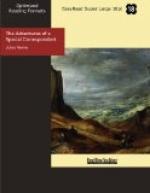Among the travelers I noticed an American clergyman bound to Pekin. This was the Reverend Nathaniel Morse, of Boston, one of those honest Bible distributors, a Yankee missionary, in the garb of a merchant, and very keen in business matters. At a venture I make him No. 13 in my notebook.
The verification of the papers of young Pan Chao and Doctor Tio-King gave rise to no difficulty, and on leaving they exchanged “ten thousand good mornings” with the more amiable of the Chinese representatives.
When it came to the turn of Major Noltitz, a slight incident occurred. Sir Francis Trevellyan, who came to the table at the same moment, did not seem inclined to give way. However, nothing resulted but haughty and provoking looks. The gentleman did not even take the trouble to open his mouth. It is evidently written above that I am not to hear the sound of his voice! The Russian and the Englishman each received the regulation visa, and the affair went no further.
My lord Faruskiar, followed by Ghangir, then arrived before the man in spectacles, who looked at him with a certain amount of attention. Major Noltitz and I watched him. How would he submit to this examination? Perhaps we were to be undeceived regarding him.
But what was our surprise and even our stupefaction at the dramatic outburst which at once took place!
After throwing a glance at the papers presented to him by Ghangir, the Chinese functionary rose and bowed respectfully to Faruskiar, saying:
“May the General Manager of the Grand Transasiatic deign to receive my ten thousand respects!”
General Manager, that is what he is, this lord Faruskiar! All is explained. During our crossing of Russian Turkestan he had maintained his incognito like a great personage in a foreign country; but now on the Chinese railways he resumed the rank which belonged to him.
And I—in a joke, it is true—had permitted myself to identify him with the pirate Ki-Tsang. And Major Noltitz, who had spent his time suspecting him! At last I have some one of note in our train—I have him, this somebody, I will make his acquaintance, I will cultivate it like a rare plant, and if he will only speak Russian I will interview him down to his boots!
Good! I am completely upset, and I could not help shrugging my shoulders, when the major whispers to me:
“Perhaps one of the bandit chiefs with whom the Grand Transasiatic had to make terms!”
“Come, major, be serious.”
The visit was nearing its end when Baron Weissschnitzerdoerfer appeared.
He is preoccupied, he is troubled, he is anxious, he is confused, he is fidgety. Why is he shaking, and bending, and diving into his pockets like a man who has lost something valuable?
“Your papers!” demands the interpreter in German.
“My papers!” replies the baron, “I am looking for them. I have not got them; they were in my letter case.”




